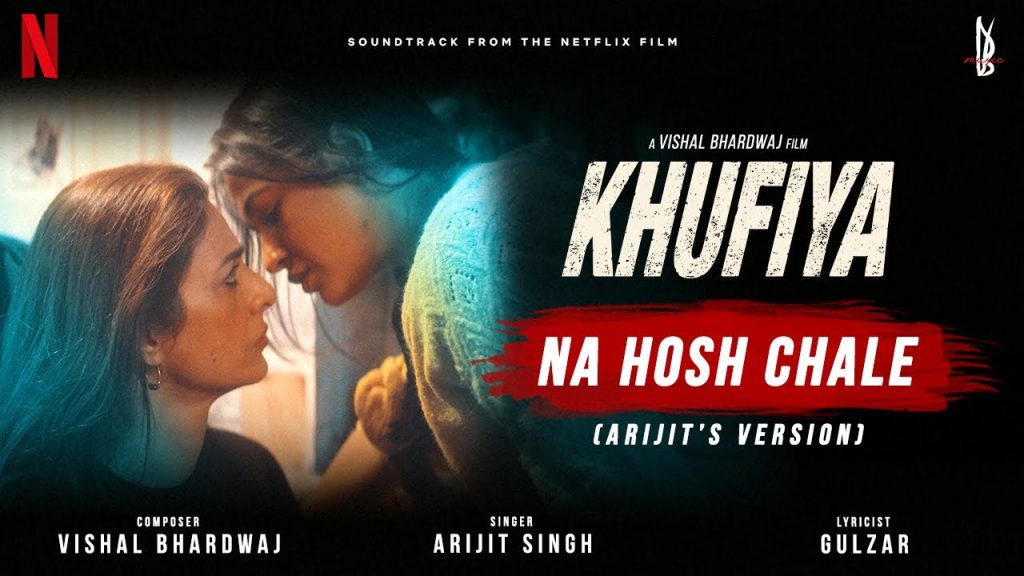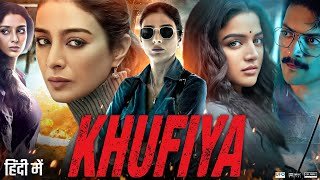Language: Hindi
Genre: Spy Thriller / Psychological Drama
Director: Vishal Bhardwaj
Starring: Tabu, Ali Fazal, Wamiqa Gabbi, Ashish Vidyarthi
Based on: The novel Escape to Nowhere by Amar Bhushan
Runtime: Approx. 2 hours 30 minutes
1. Core Premise (Spoiler-Free)
Khufiya is a cerebral and emotionally intense espionage drama centered around Krishna Mehra (KM), a skilled intelligence officer in India’s R&AW (Research & Analysis Wing). She is assigned to uncover a mole within the agency—a leak that’s not only compromising national secrets but putting lives at risk.
But this is not just a story of spies, surveillance, and betrayal. It’s a deeply layered character study, especially of Krishna herself—a woman wrestling with not only her duty but her personal losses, regrets, and moral ambiguities.
2. Narrative Style & Structure
Unlike action-heavy spy thrillers, Khufiya moves with slow-burning tension, reflective of director Vishal Bhardwaj’s storytelling sensibilities. The film unfolds more like a novel on screen, using long silences, psychological build-up, and carefully planted twists.
It’s an atmospheric thriller: espionage mixed with emotional dissection.
The story branches between:
- KM’s investigation of Ravi Mohan, the suspected mole.
- Flashbacks to her failed mission in Bangladesh that claimed the life of her lover, Heena.
- Surveillance operations conducted in real-time as they bug and monitor Ravi’s home.
- Subplots involving Ravi’s wife, Charu, who evolves in unexpected ways.
3. Character Depth & Psychological Tension
Krishna Mehra (Tabu)
A career intelligence officer, Krishna is shrewd, composed, and emotionally withdrawn. She operates with a sense of guilt and burden—we learn that her personal relationship with fellow agent Heena ended in tragedy during a botched mission.
She is driven by:
- A desire for redemption
- A mother-like protectiveness toward agents she sends into danger
- A gnawing loneliness masked by duty
Tabu brings quiet ferocity to Krishna—her gaze, her stillness, and her internal grief all speak louder than words. She is as much haunted by the ghosts of her past as she is motivated by her mission.
Ravi Mohan (Ali Fazal)
An R&AW employee suspected of leaking secrets to a foreign power. Ravi is intelligent, guarded, and morally compromised. What makes him fascinating is that he isn’t a cartoonish villain—he’s human. He has a family. He’s under immense pressure.
What we see in Ravi is not just treason, but the cost of desperation, of fractured ideals, and blurred loyalties. He’s a man unraveling slowly, even as he tries to keep a façade.
Charu (Wamiqa Gabbi)
Initially portrayed as a homemaker in the shadows of her husband, Charu becomes the film’s most surprising force. As Krishna and her team surveil her, they discover resilience, doubt, and agency bubbling within her.
She’s not just a bystander. She becomes a pivot in the investigation, embodying the idea that no one is truly innocent, and no one is entirely aware of the role they’re playing in larger games.
4. Key Themes and Symbolism
A. Surveillance as Psychological Mirror
The act of spying is not just tactical—it becomes a metaphor. Krishna watches others, but through that process, is forced to confront her own past and inner fractures.
The camera, the hidden mic, the one-way mirror—these are symbols of repressed truths, secrets we keep even from ourselves.
B. Betrayal in Layers
Everyone betrays someone:
- Ravi betrays his agency.
- Krishna feels betrayed by her own past decisions.
- Charu feels betrayed by a life she never chose.
- Even institutions betray the individuals they claim to protect.
But betrayal is never black and white. The film delves into the emotional motives behind these betrayals, making the audience question who’s truly guilty.
C. Identity, Duality, Masks
Every character in Khufiya leads a double life:
- Agents pretending to be civilians
- Husbands hiding secret alliances
- Wives hiding their awareness
- Lovers hiding their vulnerabilities
It’s a world where masks are essential—not only for survival, but as a condition of existence. The theme of “Who are you, really?” runs throughout the film.
D. Feminine Lens in Espionage
Unusually for a spy film, Khufiya explores emotional intelligence, intuition, and maternal instinct as tools of espionage. Krishna doesn’t rely on brute force—she feels, watches, understands, and then acts.
Charu’s character also embodies this: her shift from passive wife to an aware and pivotal actor is quietly revolutionary.
5. Visual and Artistic Language
Direction & Pacing
Vishal Bhardwaj directs with restraint. His scenes breathe. He allows pauses, glances, background details to speak volumes. The pacing is deliberately slow, building tension not with jump cuts, but with psychological weight.
This is a chamber drama masquerading as a spy thriller.
Cinematography
The visual tone is dark, reflective, and intimate:
- Shadowed hallways, dimly lit rooms, silent corridors
- Long camera shots watching from afar—just like the characters watch each other
- Surveillance footage woven seamlessly into the narrative—sometimes feeling more truthful than real life
Even domestic spaces feel like traps. Homes aren’t safe—they’re arenas of observation.
Sound Design & Score
The soundtrack is minimal and often blends ambient noise with subtle classical Indian motifs. It creates an uneasy calm, echoing the tension beneath the surface.
Silences are crucial—moments of withheld emotion speak louder than any score.
6. The Emotional Core
Beyond spycraft, Khufiya is about the cost of duty. Krishna, like many intelligence officers, has given up personal happiness for a nation that will never know her sacrifices.
Her grief, for Heena, is not loud. It’s buried. It lingers in her quiet breakdowns, her hardened stares, and her occasional longing glances at a photograph or memory.
And yet, despite everything, Krishna doesn’t seek glory. She seeks closure—for her past, her conscience, and the people she feels responsible for.
7. The Climax & Resolution (Spoiler-Free Insight)
Unlike thrillers that end with explosive action, Khufiya ends with emotional revelation and ethical decisions. There’s a sense of earned resolution, but not easy answers. Some characters get closure. Others are left in morally grey spaces.
The film doesn’t reward or punish—it observes the consequences of every choice.
8. Final Message
Khufiya asks a chilling but profound question:
“How much of yourself can you lose in the service of the truth before you become unrecognizable—even to yourself?”
It reminds us that national loyalty comes at a personal price. That silence can be as loud as bullets. That some of the greatest battles are fought not in warzones, but in living rooms and empty hallways.
Conclusion
Khufiya is not a typical spy thriller. It’s a haunting exploration of identity, secrecy, emotional trauma, and moral sacrifice, anchored by masterful performances and poetic direction.
It is a story where the real danger isn’t just the traitor in the agency—but the ghosts that live within us when we choose duty over love, secrecy over truth, and silence over healing.

